Welcome to our complete guide to electric heaters and heating. We've got you covered when it comes to navigating through the different types of electric heaters out there. Whether you're looking to beat the winter cold, create a cozy atmosphere, or find a cost-effective heating solution, we've got plenty of options to meet your specific needs.
In this guide, we'll explore the wide range of electric heaters, discussing their pros and cons, so you can make an informed purchase and lower your electricity bills while keeping your home warm and cosy. Let’s dive in!
- How does it work?
- Why choose electric heating?
- Costs of electric heating?
- What are the types of electric heating?
- Electric radiators
- Panel heaters
- Oil filled radiators
- Oil free radiators
- Fan heaters
- Electric fires
- Patio heaters
- Electric towel rails
How do Electric Heaters Work?
Different types of electric heating operate in unique ways, but in a nutshell: Electrical energy is transformed into thermal energy through the magic of resistance elements. As electricity passes through these elements, they warm up, generating the cozy heat output you desire.
Why Choose Electric Heating?
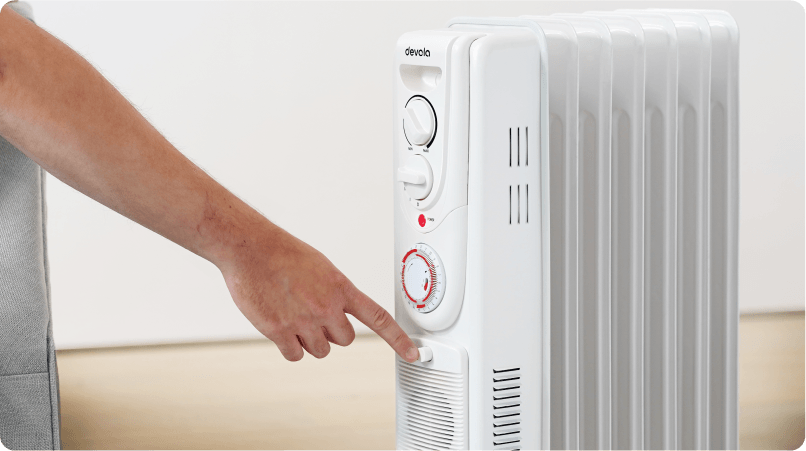
Electric heating can be an attractive choice for many reasons as it offers several advantages. Unlike traditional methods, electric heating systems are easy to install, requiring no plumbing into a central heating system or flue/chimney. They are 100% efficient at the point of use, meaning all the electricity they use is converted directly into heat. This results in lower energy costs in the long run. They also provide instant and controllable heat at the press of a button or turn of a dial.
Moreover, electric heating systems require minimal maintenance, reducing the likelihood of unexpected repair costs. They also offer an eco-friendly solution, producing no direct emissions or pollutants, making them an excellent choice for those conscious about their environmental impact.
Costs of Electric Heating?
The cost of electric heating can vary depending on the type of system you choose. Generally, electric heating systems tend to be more affordable than gas or oil-fired boilers. However, it's important to factor in your electricity bills when considering overall cost savings. Investing in a high efficiency heater can help offset energy costs and give you peace of mind that you're saving money in the long run.
What are the Types of Electric Heaters?
Electric Radiators

Electric radiators are highly sought-after and available in various sizes, making them suitable for any space, be it a cosy bedroom or a spacious living room. They offer versatility, seamlessly blending into your interior as discreet wall fixtures or serving as stylish focal points that add a contemporary flair. Crafted with aluminium or a natural dry-stone core, these radiators excel at heat retention and are equipped with an array of features, including digital programming and wireless control, ensuring optimal convenience and comfort.
For more information about Electric Radiators see Electric Radiator Buying Guide and Top 10 Electric Radiators to help you choose a radiator for you!Pros
- Great heat retention
- Less maintenance - no bleeding, no balancing, and no flushing
- Cheaper installation compared to gas central heating
- Only heat the rooms you're in, rather than the whole house
- Accurate temperature control with digital thermostats
- No carbon monoxide risks
Cons
- Electricity is currently more expensive than gas
- Incorrect installation may lead to heater electrical faults
Panel Heaters

Panel heaters work by applying the principle of convection. Heat is generated in an electric element, the warmed air transfers out of the heater and moves outwards into the room. The more powerful the heater, the wider the area of circulation of the warmed air. They warm up quickly and are quite silent when working. Panel heaters can be freestanding, or wall mounted. They are lightweight and easy to move around in your house. Some models are available which have thermostatic control to select your preferred heat setting and timers to set for certain times of the day.
To learn more about panel heaters, check out our Panel Heaters Buying Guide or Top 10 Panel Heaters.
Pros
- Provide instant heat once they are switched on
- Heat is distributed in an efficient way
- Warm rooms evenly as the air rises and falls equally within the space
- Very silent
Cons
- Less efficient than electric radiators
- Not suitable for constant use due to the heat element potentially causing sooty deposits on the wall
- Less durable than electric radiators, which can result in lower life expectancy
Check out our full guide for more information Panel Heaters vs Electric Radiators.
Oil Filled Radiators

Oil filled radiators are electric heaters with multiple fins. The fins increase the surface area of the heater whilst creating pockets for air to collect in. The radiator is full of small pipes which carry the oil around. The oil is then heated by an electrical element and pumped all-round the heater. This allows the surfaces of the radiator to heat up, warming the room. They usually have a control panel, with the thermostat to set the temperature and a timer to choose time intervals.
To learn more about oil filled radiators, check out our Oil Filled Radiators Buying Guide or Top 5 Oil Filled Radiators.
Pros
- Excellent thermal retention, therefore lower running costs
- A lasting, comfortable warmth over a longer period of time
- No need to refill the oil, as it won't burn or evaporate inside the radiator
Cons
- Doesn’t provide instant comfort as it takes around 15 minutes to heat up fully
- Heavy to move around in the home, as they have the added weight of the oil
Oil Free Radiators
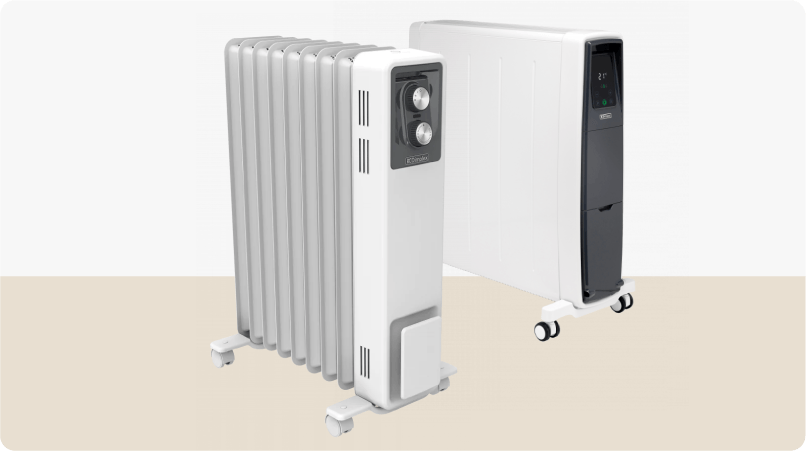
Oil free radiators work by using thermal components, like ceramic stone or aluminium. The heat is transferred by the processes of convection and radiation. Convection transports the heat around the room, and the radiation emits the heat to the air. The room will warm up quickly, as this heating technology is the most advanced.
Pros
- Easy to use and don't make much noise when on
- Light and portable, meaning you can move them from room to room with less hassle
- They warm up fast
- Ideal for large spaces, homes with high ceilings, open floor plans and stairwells
Cons
- Less heat retention compared to oil filled radiators
- Doesn’t distribute heat evenly
Check out our full guide for more information Oil filled vs Oil free radiators: Which is best for your home?
Fan Heaters

Fan heaters pass air through a heated element, and then disperse the warm air out into the room using its built-in fan.
There are two types available:
- Fan heaters which use a metal element to generate heat.
- Ceramic heaters which use a ceramic element to convert the energy into heat quicker and more efficiently than the metal version. It can also output the same level of heat at a lower power rating, making it more cost efficient.
Fan heaters are ideal if you want to heat a specific area of your home quickly. They are also ideal for heating up smaller spaces, as they are compact in size. Fan heaters are mostly used in bathrooms, garages, and attics.
Pros
- Low price heating
- Poratble, easy to lift, and carry
- Significant heating power
- Modern design
Cons
- Consume a lot of electricity compared to the heat output
- Can be noisy
Electric Fireplaces
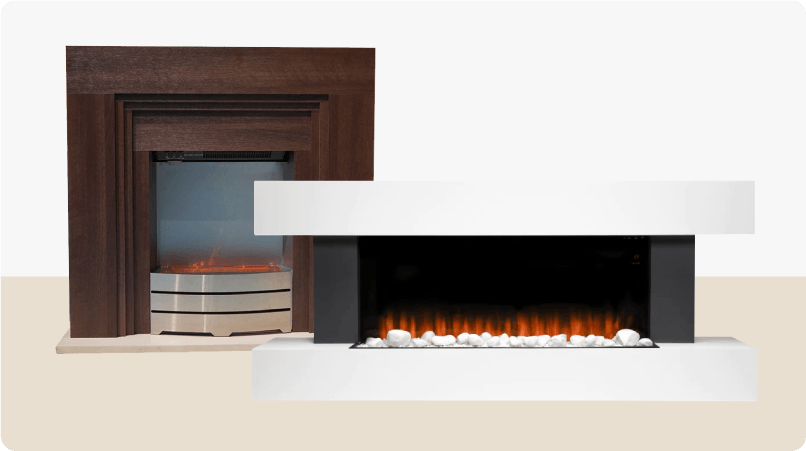
Electric fires provide the warmth and atmosphere of a real fireplace, without the use of gas, wood or coal as the heat source. They use electricity to generate heat in the metal coils of the electric fire. The internal fan distributes the heat throughout the room. The installation is simple, as the electric fire only needs to be plugged into an electrical socket.
To learn more about electric fires, check out our Electric Fires Buying Guide.
Pros
- High efficiency as heat energy is not lost through the burning of fuel or chimney
- No servicing costs, as they are easy to maintain
- Safe as they don't produce toxic fumes
- Installation is simple, just plug in and go
- Variety of designs available
- Most designs can be hardwired to hide the plug and cable
Cons
- Noisy because of the fan within the fireplace
- Heat output is typically limited to 2kW for safety
- It takes a longer time to heat up the room
Patio Heaters
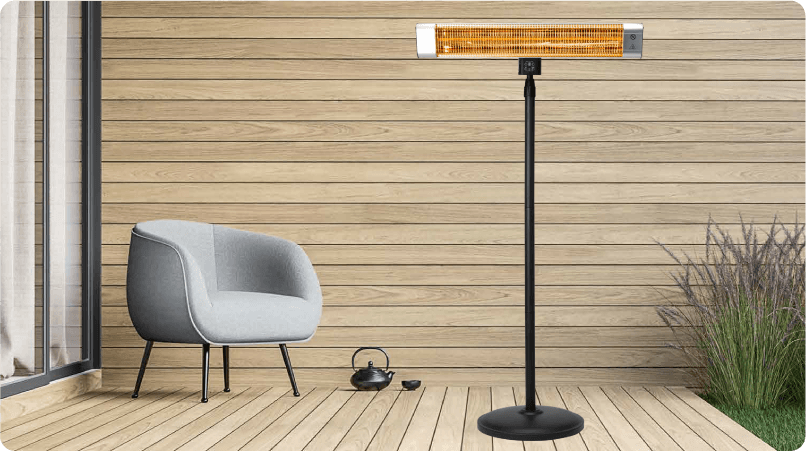
Patio heaters use the heat transfer method of radiant heat to warm up the outdoor environment. They will warm up people, furniture and objects directly, which means the heat won't be lost by the wind. Patio heaters are the most efficient way to heat an outdoor space, as people will retain the heat and radiate it out further. They are suitable for homes, as well as commercial environments like bars, cafés, restaurants, terraces and warehouses.
To learn more about patio heaters, check out our Patio Heaters Buying Guide or Top 10 Patio Heaters.
Pros
- Great for outdoor gatherings with friends and family when it's cold
- They come in multiple sizes and design options
- Affordable and portable
- Can heat a large area
- Floor standing and wall mounted options available
Cons
- May cost more in the long term, due to electricity consumption
Electric Towel Rails
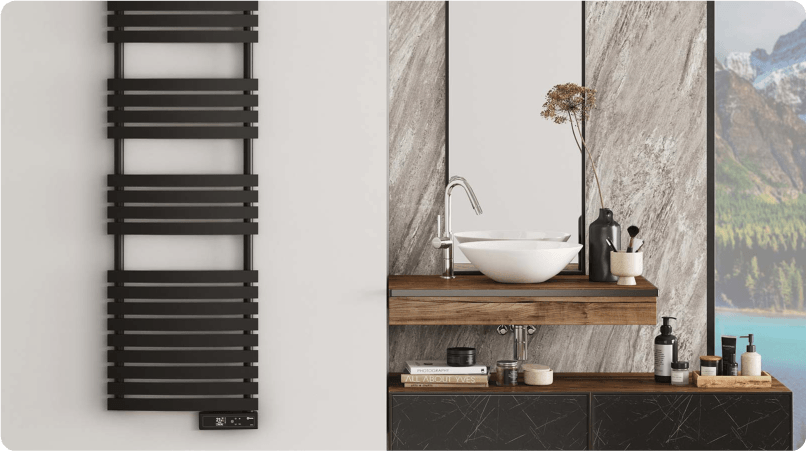
Electric towel rails are a great way to heat your bathroom, giving you all the warmth and comfort of central heating without the cost. The heated towel rail will warm your towels up quickly so that when you step out of the bath or shower after enjoying a long soak, your towels will be warm and cosy!
Electric towel rails are available in a wide range of sizes and styles to suit any bathroom. Our range includes traditional designs with modern finishes to give your bathroom that contemporary feel. They are also incredibly efficient, as they don’t need to be switched on for long to heat up your towels.
Pros
- Energy efficient, as they only use a small amount of electricity to keep your towels warm and cost
- Can provide extra warmth during the cold winter months as they generate heat without relying on central heating
- Great for smaller bathrooms
Cons
- Installation can get expensive as they require professional hardwiring due to their position in the bathroom
- Not as durable as their water-based versions
Our Heater Collection
With electric heaters, you can quickly and effectively heat any room just the way you like it. Plus, you'll enjoy lower energy costs and reduce your carbon footprint. When your central heating falls short, electric heaters are the perfect addition to your home. Whether you need a boost of warmth in the morning or sustained heat in the evening, our range of electric heaters offers exceptional value for money. Stay cosy all winter long!








 Home Dehumidifiers
Home Dehumidifiers
 Drying Clothes Dehumidifiers
Drying Clothes Dehumidifiers
 Low Energy Dehumidifiers
Low Energy Dehumidifiers
 Compressor Dehumidifiers
Compressor Dehumidifiers
 Desiccant Dehumidifiers
Desiccant Dehumidifiers
 Commercial Dehumidifiers
Commercial Dehumidifiers
 Swimming Pool Dehumidifiers
Swimming Pool Dehumidifiers
 Wall Mounted Dehumidifiers
Wall Mounted Dehumidifiers
 Dehumidifier Accessories
Dehumidifier Accessories
 Humidifiers & Air Purifiers
Humidifiers & Air Purifiers
 Inline Fans
Inline Fans
 Kitchen Extractor Fans
Kitchen Extractor Fans
 Bathroom Extractor Fans
Bathroom Extractor Fans
 Commercial Extractor Fans
Commercial Extractor Fans
 Shower Extractor Fans
Shower Extractor Fans
 Silent Extractor Fans
Silent Extractor Fans
 Heat Recovery Extractor Fans
Heat Recovery Extractor Fans
 PIV & Whole House Ventilation
PIV & Whole House Ventilation
 Extractor Fan Accessories
Extractor Fan Accessories
 Extractor Fan Controllers
Extractor Fan Controllers
 Panel Heaters
Panel Heaters
 Fan Heaters
Fan Heaters
 Patio Heaters
Patio Heaters
 Storage Heaters
Storage Heaters
 Towel Rails
Towel Rails
 Underfloor Heating
Underfloor Heating



 Electric Fires
Electric Fires
 Time Controllers
Time Controllers
 Portable Air Conditioners
Portable Air Conditioners
 Evaporative Air Coolers
Evaporative Air Coolers
 Wall Mounted Air Conditioning Units
Wall Mounted Air Conditioning Units
 Commercial Cooling
Commercial Cooling
 Ceiling Cassette Air Conditioning
Ceiling Cassette Air Conditioning
 Desk Fans
Desk Fans
 Pedestal Fans
Pedestal Fans
 Floor Fans
Floor Fans
 Tower Fans
Tower Fans
 DC Fans
DC Fans
 Air Circulators
Air Circulators
 Ducting Kits
Ducting Kits
 Internal Grilles
Internal Grilles
 External Grilles
External Grilles
 Ducting Hose
Ducting Hose
 Ducting Clamps
Ducting Clamps
 Ducting Connectors
Ducting Connectors

 Electric Radiators
Electric Radiators
 Oil Filled Radiators
Oil Filled Radiators
 Oil Free Radiators
Oil Free Radiators
 Designer Radiators
Designer Radiators
 Water Boilers
Water Boilers
 Under Sink Water Heaters
Under Sink Water Heaters
 Over Sink Water Heaters
Over Sink Water Heaters
 Unvented Water Heaters
Unvented Water Heaters
 Instant Water Heaters
Instant Water Heaters
 Boiling Water Taps
Boiling Water Taps
 Hand Wash Units
Hand Wash Units
 Air Curtains
Air Curtains
 Commercial Wall Heaters
Commercial Wall Heaters
 Returned Air Conditioners
Returned Air Conditioners
 Returned Fans
Returned Fans
 Returned Dehumidifiers
Returned Dehumidifiers
 Returned Heaters
Returned Heaters




